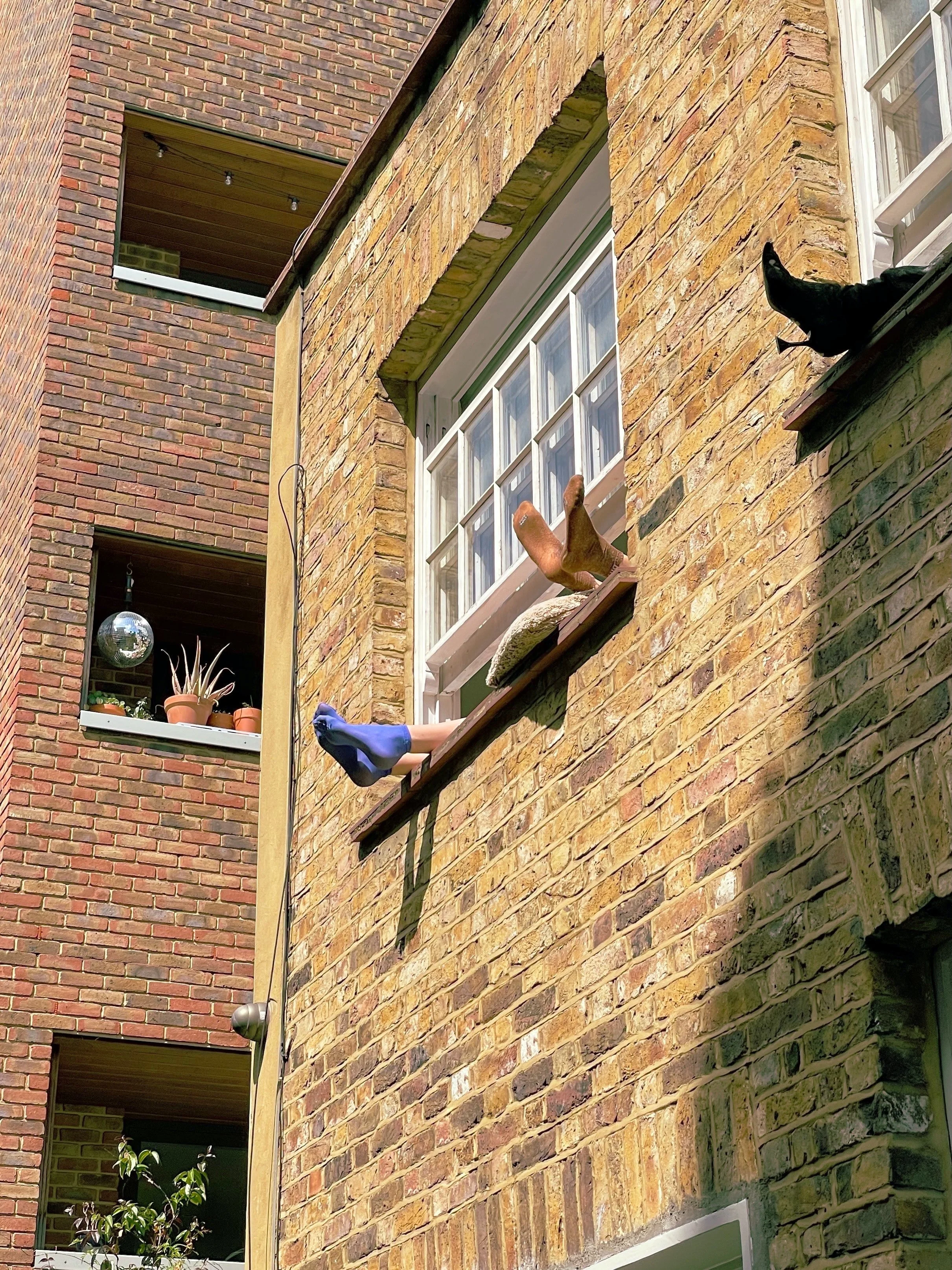Taking Care in Heat
You can register to receive heat-health alerts notifications when a heatwave is expected. Shade the UK have set out advice to keep yourself and others safe and comfortable during periods of prolonged hot weather.
The Basics
When your body heats up, it will try its best to maintain its normal temperature (the marvel of homoeostasis). Its natural defence mechanism is sweating: this means water evaporates from the skin by taking up the excess body heat, thus cooling you down. A fan or gentle breeze of air makes this process faster, whilst allowing more heat to be removed from the body by the air itself.
Under normal summer conditions, this might be enough. But as our climate gets hotter we must do more to protect ourselves and others, becoming more proactive and resourceful.
During a heatwave, you can follow these simple tips and tricks to protect yourself from the heat:
Keep in the shade and in cool(er) spaces - try to avoid being in the direct sun from 11am to 3pm.
Stay well hydrated with cold non-alcoholic and non-caffeinated drinks - examples include include water, sports drinks, tea, and coconut water.
Eat fruit and vegetables that have a high water content, such as like strawberries, cucumber, watermelon, oranges, tomatoes, peppers, celery, and lettuce. Examples of hydrating drinks include water, sports drinks, tea and coconut water. Try to avoid sugary drinks.
Wear loose fitting and light coloured clothing of natural fibres that ‘breathe’ - examples include cotton, linen, and silk.
Take lukewarm shower(s) i.e. with water that is lower than body temperature but not below 20oC as that would stop blood flow to the skin and trap the heat in the body.
Submerge in water or apply cold compress or wet cloth to parts of your body with superficial veins (hands & wrists, ankles, torso, neck, temples, groin or armpits)
Apply sun lotion (Factor 50) every two hours
Taking Care Indoors
Keep the sun out
Draw blinds and curtains. In rooms with no shades, you can buy or make your own external shade using a bed sheet or towel.
Open Windows strategically
When the outside temperature is cooler than inside, open windows in different rooms to cross-ventilate and make a breeze through the home, drawing hot air out and cool air in. Make sure to do this at night-time to help you sleep better, as outdoor temperatures would typically be cooler than indoors. Also consider soaking the base of your curtains in water. As the liquid rises through the material, it will cool the air flowing over into your home. If you have sash windows, leave both the top and bottom parts open: cool air will flow in from the bottom and hot air will get exhausted from the top. At peak hours of the day, you might be better off keeping the windows closed and shaded to keep the sun’s heat and hot air out.
Use fans strategically
Place fans in front of/next to an open window as it will help bring the cooler outdoor air in. Fans are also better placed on lower surfaces to circulate cooler air from floor level. You can also place some ice or cold water in front of the fan to cool the air flow, there are also devices on the market that integrate ice and cold water into the fan. A bigger surface area will have a greater cooling effect, so consider placing a big tray of water or a couple of frozen water bottles directly in front of the fan. Be mindful that if the air is above 35°C, you may not be better off using your fan!
Adjust your habits
During both day and night, stay in the most shaded, cooler rooms of the house (north facing, west facing during early morning hours, east facing during evening hours or highly shaded through other buildings or trees). If your home has more than one level, stay in the lowest one. Move the bedroom around indoors or take it outdoors: if outdoor temps at night are cooler than indoors, consider sleeping on the terrace/garden or roof (using a mosquito net in certain locations!).
Watch out for internal heat sources
Make sure your heating is off and all lighting/appliances are completely switched off and not in stand-by mode. Check that you are not unnecessarily heating up your hot water tank still on a pre-set timer. Cook during the cooler hours of the day/evening and avoid using the oven or hob. Why not switch to eating salads or meals that avoid using heating.
Taking Care Outdoors
Minimise your journeys, time spent outdoors & activity at peak times/days
Take shaded routes
If walking or cycling somewhere, plan your route ahead of time to stick to covered paths using help from sites like the London Tree Canopy Map.
Make use of green & cool public spaces
Schemes like London Cool Spaces provides a map of buildings with amenities to help you cope in hot weather. Community centres, public libraries and museums, as well as cinemas and sports centres, are generally good options to take shelter
Avoid hot and crowded public transport
While the Tube may get you there faster, travelling via other modes of air conditioned transport, such as bus, tram or overground train, will likely keep you cooler.
Stay hydrated
Use insulated bottles to carry cold drinks/water with you at all times & refill along the way. Alternatively, put plastic water bottles in the freezer for a few hours or night before to take with you.
Accessorise for heat
Wear a hat, sunglasses & sun lotion, carry an umbrella/parasol (ideally a UV protection one), hand held fan or spray mist. Remember that loose-fitting, light coloured clothing of natural fibres is best.
Taking Care of Others
Keep an eye out for anyone you know who may be at higher risk during a heat wave, amongst family, friends and neighbours. Vulnerable individuals include the elderly, people suffering from certain medical conditions, such as those with cardiovascular or respiratory diseases, or taking medication that affects heart or kidney function, cognition or ability to sweat), people living in the street or in poor quality homes. Think about the people who work outside too, such as construction workers, gardeners, postal operatives, road workers, waste collectors.
The elderly and those with long-term health conditions
Check in on those that live on their own
Elderly individuals may be less adept with technology so be sure to warn them if a heat alert is issued
Help them prepare before the heatwave (stock up on groceries, food + medicine)
Give advice or show them how to protect indoors & outdoors, need for drinking water even if they don’t feel thirsty, and take them through some cooling down tips:
Placing a cool washcloth on the back of the neck and have a pan of cool water close by to periodically re-cool the towel
Sit with their feet in a pan of cool (but not too cold) water.
Take a cool shower, bath, or washcloth wipe-down with water just below body temperature.
Offer to provide food so they don’t have to cook (light cold meals are better)
Offer to take them to a cool public space such as a recreation centre, senior centre, shopping mall, library, museum or cinema if their home gets too hot.
People without a home
Offer goods that will help them cope with the heat, such as hats, suncream, umbrellas/parasols, cold water bottles, fan light clothing and hydrating foods
Encourage them to move into a shaded spot, to stay hydrated and help them to cool down by advising on spraying or sponging with cold water
Check whether any of your local community spaces offer refuge and direct homeless individuals there in hot weather
Make a donation to a charity which might be able to help provide shelter to homeless people
Act on signs of heat-related stress
If things start to go wrong, people may suffer heat exhaustion which if left unattended may lead to a heatstroke, a medical emergency. Resources listing the symptoms of both conditions by the NHS are available here. If need be, call for medical help (111 for minor symptoms and 999 for severe symptoms).
Animals and Wildlife
It’s not just people that struggle in the heat; animals too are greatly impacted by extreme conditions. Put out a bowl of water in your garden or balcony, if you have one, for birds and other wild animals to have a drink.






